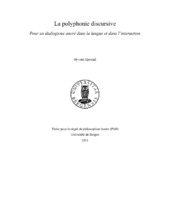La polyphonie discursive: Pour un dialogisme ancré dans la langue et dans l’interaction
Abstract
The aim of the present thesis is to develop a theoretical and methodological framework for the study of polyphony in discourse, and to apply it to the analysis of a speech by French President Nicolas Sarkozy to the European Parliament (EP). The Scandinavian theory of linguistic polyphony (ScaPoLine) describes the manner in which different linguistic markers – such as reported speech, epistemic modality, pragmatic connectives and negations – signal voices which do not correspond to that of the speaker at the time of utterance. When President Sarkozy says that “We must not be afraid of identities”, the negation signals that someone else has the opposite point of view. The identity of this individual or collective is not linguistically encoded, but might be inferred with the help of co(n)textual information. However, the presence of such voices does not depend on specific linguistic markers. Inspired by the philosophy of the Russian semiotician Mikhail Bakhtin, the linguistic theory of praxematics considers the presence of such voices to be a ubiquitous phenomenon. Discourse is fundamentally dialogical. No one speaks in complete isolation from what has been said before or without considering how the message will be received. The voice of “the other” is therefore present in any utterance, whether or not this presence is signalled by specific linguistic markers. The question is how this property of discourse can be theoretically described and systematically analysed. The ubiquitous nature of Bakhtin’s dialogism risks impeding its applicability. How can one analyse that which is everywhere? This theoretical problem can be resolved by delimiting a discursive polyphony, corresponding to the voices which occur as a function of the speaking subject’s communicative intention. Imagine telling an unsuspecting friend: “Your wife is faithful”. He would likely wonder who has said otherwise. There is an implicit voice which is not linguistically signalled but which appears in light of the utterance’s co(n)text. The theoretical discussion is followed by the development of a methodological framework for the analysis of discursive polyphony. The challenge is both to explain the interpretation of utterances containing polyphonic markers in co(n)text, as well as to account for possible polyphonic interpretations of utterances which do not contain such markers. The modular approach developed by the Geneva school of discourse analysis represents a systematic analytical tool, by treating discourse as a complex phenomenon which consists of several linguistic, textual and situational subsystems, or modules. In the analysis of discursive polyphony, the linguistic phase (based on the ScaPoLine) is coupled with the analysis of the relation between different parts of the text structure (e.g. argumentation or reformulation), as well as with situational parameters. This framework is applied to a segment of Sarkozy’s speech, in which he promotes a European identity while maintaining the need to preserve national identities. By doing so, he positions himself between federalist and nationalist voices in the EP, thereby striking a conciliatory note. He then says: “Human rights are part of the European identity”. Linguistically monophonic, the utterance gives rise to other voices in light of co(n)textual factors. In this case, Sarkozy is in opposition to a collective Euro-sceptic voice, while aligning himself with a federalist and interventionist voice. The notion of discursive polyphony can serve to describe how voices are mobilised and constructed strategically in verbal interactions, by means of both linguistic and discursive mechanisms.
